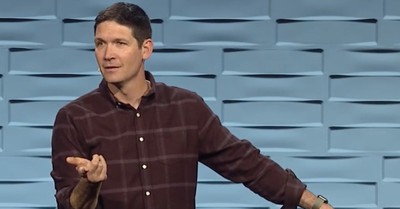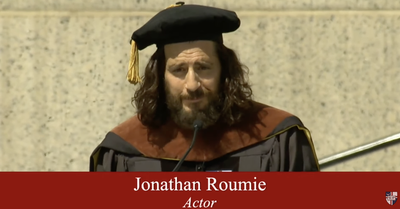
The creator of The Chosen is defending the much-debated “He Gets Us” Super Bowl ads, saying in a social media post the commercials properly represented a single attribute of Jesus.
The first commercial, aired in the first half, has drawn the most criticism. In it, viewers see 12 successive depictions of individuals washing the feet of others. In the ad’s final moments, viewers see words on the screen reading: “Jesus Didn’t Teach Hate. Jesus Washed Feet. He Gets Us. All of Us.”
It’s been viewed more than 700,000 times on Youtube.
The ad guides viewers to a website: HeGetsUs.com/LoveYourNeighbor, where they can learn about Jesus’ ministry. The website says foot washing is the “perfect example of how we should treat one another, even those people with whom we don’t see eye to eye.”
The images include pictures of a police officer washing the feet of a black man, a woman washing the feet of what appears to be an immigrant, a woman washing the feet of another woman outside a family planning clinic (an abortion clinic), and, apparently, a priest washing the feet of a gay man. Although some viewers thought the images were AI generated, they were shot by international fine art photographer Julia Fullerton-Batten.
“If all the people criticizing the He Gets Us ads just pooled a little money together, they could finance and produce their own ad and try to get all their favorite characteristics of Jesus into 30 seconds,” Jenkins wrote on Facebook. “Because Heaven forbid we'd only talk about one for 30 seconds.”
Jenkins’ post drew 2,000 comments. Some disagreed with him.
“I understand the frustration because I know so many don’t handle this conversation well. But when looking at the ad as a whole, it doesn’t really focus on who Jesus is,” one person wrote. “I look at your portrayal of Christ in the show and am inspired. But this ad says Christ will accept who you are and that’s not true. Christ will take who you are and transform you into who you should be. I know it could be a conversation starter but the premise is dangerously misleading on who Christ is and what choosing Him means.”
Others, though, said Jenkins was correct. “I loved the message that ‘He gets us.’ He does,” one person wrote on Jenkins’ timeline. “Why do Christians attack those who are trying to spread the good news about the love of God? I'm getting so tired of it. It makes me sad.”
The He Gets Us website includes links to seven Bible reading plans that present the gospel. One Bible reading plan, dubbed “Who did Jesus say he was,” includes a sample prayer of salvation. (“The Bible tells us that our sins separate us from God, both now and in eternity,” the plan says. “Gratefully, Jesus makes a way for us to live through his death. He says boldly that he is the only way to be rescued from sin’s consequence (John 14:6).”)
Columnist Billy Hallowell, writing in The Washington Times, said the ad could be a good discussion-starter for Christians talking to their non-Christian friends.
“That I saw amid a mixture of photos were numerous images representing people living unbiblical and sinful lives or making unfortunate choices in violation of biblical truth,” Hallowell wrote. “Rather than co-signing these actions, the ad seems to be subtly clumping these people together. The message to me wasn’t ‘endorse these decisions.’ Instead, it was an indication these individuals and actions were outside of truth and righteousness and that those making such choices in profound lostness need -- as we all do -- God’s love.
“From the woman seeking an abortion to an LGBTQ person, the Christian is depicted as stepping out in faith to show Christ’s care,” he wrote.
Shawn McEvoy, Director of Editorial for Salem Web Network, urged Christians to use the ad to tell others about Christ. “I personally did not interpret the ad's message as merely ‘unity,’ ‘be kind’ or ‘kum-ba-yah.’ But to follow an example set by, well, you know, and remembering that the people you think are creating your problems aren't THE problem (Eph. 6:12),” McEvoy wrote in a Crosswalk.com column. "That you can serve an outsider and love an enemy, and it doesn't mean that 10 minutes later you aren't still on opposite sides of an issue or that neither of you will ever have another thing to repent from."
RELATED: He Gets Us, and I Get Their Ad: Here's Why
RECOMMENDED PODCAST:
Image credit: ©The Chosen/Angel Studios
Michael Foust has covered the intersection of faith and news for 20 years. His stories have appeared in Baptist Press, Christianity Today, The Christian Post, the Leaf-Chronicle, the Toronto Star and the Knoxville News-Sentinel.










